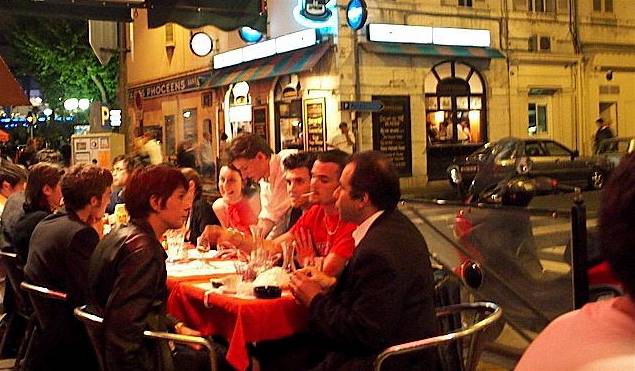The following article was originally published on May 17th, 2000.
CANNES, France — My editor was impressed that I had seen 16 movies in five days here. “I could easily double that,” I told her, “if I could get anyone to bring me a check.”
What is it with the French reluctance to present l’addition after a meal? They have a horror of taking your money. The typical dining experience in a French restaurant consists of:
9 minutes: You are ignored while standing in the doorway, while waiters and owners rush past you with their eyes sharply averted, as if you are a flasher.
17 minutes: You wait for the presentation of la carte. This is a publication the size of a bedspread, and hidden within its folds is le menu, which translates as “blue plate special.”
12 minutes: You peer at the food items and try to remember your high school French. Your choices are limited to chicken and lamb, because poulet and agneau are the only words you can recall. (You also know the words for “french fries” and “ice cream,” because those are the only two things they serve in a French restaurant that you really want to eat.)
4 minutes: You note that le menu is a three-course meal half as expensive as anything else. You ask the waiter to translate it for you. Today’s special commences with a soup of gruel of barnacle. The main course is tripe corkscrews marinated in brine, gratinee. For dessert, le chef recommendez a pie of mustard greens, pine nuts and raisins, asleep on its bed of rhubarb.
38 minutes: You wait for your order to be served. The waiter arrives at your table bearing two dishes, and says, Vousnouspretdecider? as fast as he can. This translates as “which has which?” You and your wife look at the two dishes he holds. She has ordered fish. You have ordered chicken or lamb, you forget. It is impossible to tell which of the dishes might be fish or, for that matter, might not be fish. Both dishes consist of brown stuff piled in the middle of the plate on a bed of more brown stuff, mounted by a sculpture made from greens that when you were were a kid you used to yank out by the roots.
9 minutes: You dine.
2 hours, 17 minutes: You wait for the check. The first hour of this time passes with the waiters rushing past your table on obscure missions involving standing outside the restaurant smoking cigarettes. The second hour is taken up with assurances that the bill will be presented momentarily. At the beginning of the third hour, you experiment with the possibility that the waiter is not French and ask for l’addition in several other languages, including Italian, in which the correct word would sound very rude if it were English, which however it isn’t, not that the waiter speaks it, anyway.
45 minutes: The waiter waves a check cheerfully at your table from across the room and presents it to the proprietor’s grandmother. This is a formidable old lady dressed in mourning clothes, who sits on a high stool behind an elevated podium and is the master of an adding machine with a crank that she wields as if smashing walnuts. She adjusts her bifocals, which are chained to her neck by a jeweled cord, and double-checks the addition 17 times. She simultaneously prepares the bills of sale for three real-estate transactions, says oui! countless times into a telephone, and leans over to talk tenderly to what is apparently a living creature residing under her podium — a dog, possibly, or her husband.
4 minutes: The bill is presented. You slam down your Visa card, but the waiter is too fast and has hopped across the room before he can see it.
2 minutes: Another waiter, whom you have never seen before and will never see again, arrives at your table with a battery-powered device into which he inserts the card. This device, the size of an electric razor, telephones the home office in Omaha, confirms the transaction, and prints out a receipt, which you must sign. You are impressed by this technology until you return home, receive your bill and discover that the device believes there are six dollars to the franc and not the other way around.
Then you recall that on your way into the restaurant, you spotted a new McDonald’s across the street and lamented this despicable invasion of French culture by crass corporate America. Now all you can think of is their french fries.











